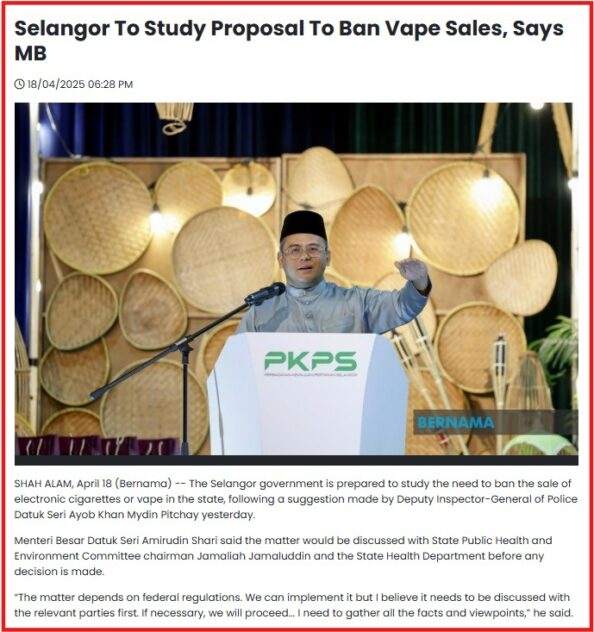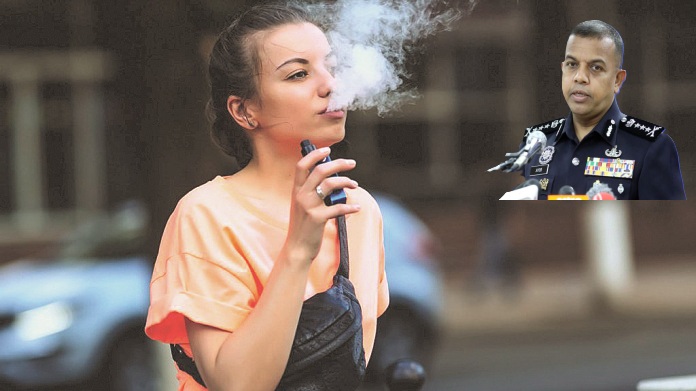THE Consumer Choice Centre (CCC), a non-profit consumer advocacy group promoting consumer freedom of choice, innovation and smart policies, has warned against the call by Deputy Inspector-General of Police’s (IGP) Datuk Seri Ayob Khan Mydin Pitchay for state-level bans on vaping.
CCC’s Malaysia representative Tarmizi Anuwar described the call as “not only legally inconsistent” with the Control of Smoking Products for Public Health Act 2024 (Act 852) but also risk jeopardising public health outcomes while expanding the illicit trade in nicotine products.
“The Federal government has already passed Act 852 to regulate – not prohibit – vape products,” insisted Tarmizi.
“State-level bans would fragment the legal framework, send mixed signals to consumers and weaken enforcement. Worse, prohibition has proven ineffective in reducing consumption in multiple countries with Malaysia risks repeating the same mistake.”
Towards this end, Tarmizi pointed to global examples that demonstrate how bans lead to black markets instead of reducing actual consumption.
- Bhutan: Once praised for being the first country to ban tobacco sales and use, Bhutan was forced to lift its prohibition on imports during the COVID-19 pandemic when it became clear the ban had failed to curb use.
Bhutanese media reported that tobacco use did not cease – in fact, consumption spiked, driven by illicit trade and unsafe products.
- South Africa: A five-month ban on tobacco sales in 2020 had disastrous effects. A staggering 93% of smokers continued to access cigarettes, often through informal channels.
Prices surged by 250%, boosting the illicit market and putting consumers at greater health risk due to unregulated products.

“These real-world examples show that bans don’t eliminate demand – they merely shift supply to unregulated, untaxed and often dangerous sources,” justified Tarmizi.
Additionally, he emphasised the severity of Malaysia’s own illicit tobacco trade where 55.3% of the domestic market in May 2023 was attributed to illicitly traded cigarettes.
Claims on vape dangers
Responding to recent which claimed that up to 65% of vapes contain banned substances like methamphetamine and ecstasy, Tarmizi stressed that “vape products have been shown in numerous studies to be effective for helping smokers transition away from combustible cigarettes which pose far greater health risks”.
“What Deputy IGP Ayob is suggesting amounts to anecdotal scare stories meant to alarm the public – it paints all vape products with the same brush when in reality, these cases typically involve smuggled products or cartridges misused for substances unrelated to nicotine or vaping.”

Aligning enforcement with public health goals Tarmizi reiterated that 73% of Malaysian vapers are former smokers who use vaping as a harm reduction tool. “Pushing them back to combustible tobacco through misguided bans will harm public health more than help it,” he insisted.
He also underscored the importance of protecting consumer choice and access to regulated products.
“Adults should have the freedom to choose less harmful alternatives. Act 852 ensures a legal, controlled environment for consumers to make informed choices,” stressed Tarmizi.
“Enforcement must focus on dismantling illicit networks, not penalising consumers trying to quit. Aligning enforcement with public health goals is key to reducing both smoking and illegal trade.” – April 29, 2025









